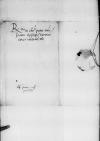Letter #2730
Bona Sforza to Ioannes DANTISCUSWarsaw, 1544-06-02
| received Heilsberg (Lidzbark Warmiński), 1544-06-06 Manuscript sources:
| ||||
Text & apparatus & commentaryPlain textText & commentaryText & apparatus
Reverendo in Christo Patri, domino
Servitor Vestrae Paternitatis cum litteris venerat huc ad
curiam sub absentia domini
Bene et feliciter valeat Vestra Paternitas.
Dat(ae) or Dat(um)⌈Dat(ae)Dat(ae) or Dat(um)⌉


 BCz, 1601, p. 732
BCz, 1601, p. 732